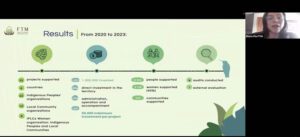31/05/2024. San José, Costa Rica
Maria Pía Hernandez, our manager, recently participated in a highly impactful webinar organized by EDGE Funders alongside other Indigenous-led funds, including the Nusantara Fund in Indonesia. Additionally, insights from philanthropy were shared by representatives from IFIP and Thousand Currents. EDGE Funders is a community of 320 donors, foundation officers, trustees, and advisors from over 30 countries. This alliance works within philanthropy to raise awareness and deepen understanding of the interconnected crises threatening our common future, aiming to increase resources for systemic alternatives that support justice, equity, and the well-being of the planet.
Webinar: Indigenous-Led Funds – Challenges and Opportunities of Shifting Power
The webinar, titled “Indigenous-Led Funds: Challenges and Opportunities of Shifting Power,” explored the crucial role of Indigenous Peoples and Local Communities (IPLCs) in conserving approximately 32% of the world’s lands, which contain vast amounts of biodiversity essential for addressing global climate goals. Despite their significant contributions, IPLCs have faced historical injustices, including systemic racism, dispossession, displacement, and extractivism in their territories. Unfortunately, less than 2.9% of philanthropic funding reaches these communities directly, even though there is growing recognition of the importance of funding IPLCs and including them in decision-making processes.

Key Insights from Maria Pía Hernandez
Maria Pía highlighted the disproportionate flow of funding to Indigenous Peoples and local communities, particularly in regions like Mesoamerica, which, despite being small, holds over 7% of the world’s biodiversity and endemic species. She emphasized the critical need for direct investment in these territories to achieve climate change and global biodiversity goals. Direct investment not only means access to funding but also investing in what truly matters for the communities, ecosystems, and the environment. The Mesoamerican Territorial Fund (FTM) addresses these urgent issues with an innovative approach to changing the flow of cooperation, both philanthropic and bilateral, ensuring that resources allocated for climate change, biodiversity conservation, and Indigenous and local community rights make a real impact in the territories.
Challenges and Solutions
She discussed some of the challenges faced during this time and how donors can better resource such funds. The current financial flow design often hinders climate financing from reaching the communities and Indigenous peoples directly. While intermediaries like governments, implementing agencies, and large NGOs play a role, it’s essential to ensure proportionality and justice in funding allocation. Without changing this pattern, we won’t effectively combat climate change or promote the rise of Indigenous and local communities, nor will we achieve global conservation goals.
Achievements and Future Plans
In the past three years, we have impacted 32 projects in the region, supported six countries through small and medium grants ranging from $10,000 to $50,000, and invested over $1,000,300 USD. This signifies our commitment to making a tangible impact by working directly with communities. We are streamlining procedures, making funding requirements more flexible, and prioritizing support for women and youth organizations. Our efforts include assisting organizations in formulating proposals and enhancing their capacities to access, monitor, and implement funding effectively.

A Call for Culturally Adapted Procedures
We are advocating for culturally adapted procedures and a better understanding of different contexts. We are not asking for a blank check but for processes that respect and adapt to the unique needs of each community. Maria Pia stress out.
Long-Term Sustainability and Hope
This ongoing discussion is being integrated into the agendas of international organizations and corporations, reflecting on the true utility of financial resources. Although progress is slow, it is steady, and this gives us hope.
You can watch the full webinar here.
Suggested resources to delve deeper
IFIP Statement on Historical COP26 Climate Commitments
While this is a moment of celebration, these commitments are not sufficient until they are translated into action.
Empowering Indigenous communities: The rise of Indigenous-Led Funds
Over the last few years, we have seen attention going to initiatives that aim to redistribute funding in a way that acknowledges that those who are in closer proximity to the communities they serve have a deep understanding of the context, problems, priorities, and solutions of those communities; thus know best what is needed to address the challenges they face.
Step up, Step Back: Reimagining Non-competitive Grantmaking Community
In June 2021, the Equality Fund embarked on a journey to reimagine traditional competitive grantmaking models. The impetus was the design of a new funding program—Activate— which flows resources to feminist funds1, supporting their capacities to move money to their own networks of partners.
IFIP produces original research that is building a knowledge base of Indigenous philanthropy.
Indigenous Led Funds Working Group
A collaborative learning space to shift funding paradigms in support of Indigenous Peoples Self-determination.

